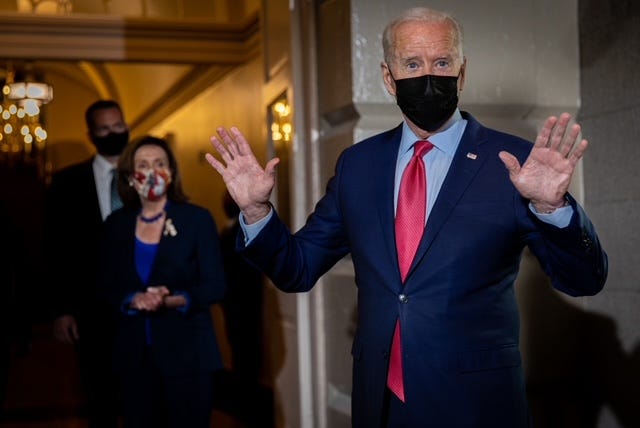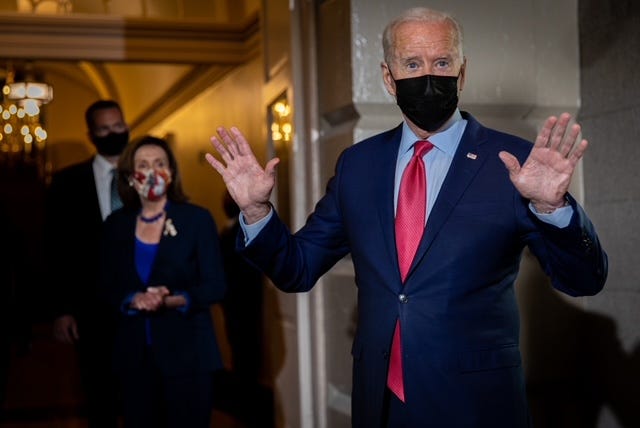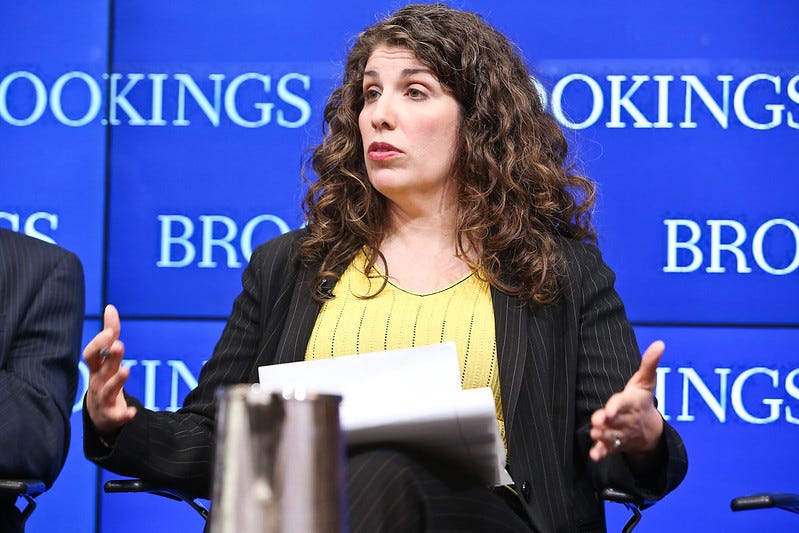Wake Up To Politics - October 28, 2021
Wake Up To Politics: Democrats have a deal
Good morning! It’s Thursday, October 28, 2021. Election Day 2024 is 1,104 days away. Election Day 2022 is 376 days away.
Biden to announce spending framework backed by all Democrats
President Joe Biden is expected to unveil a framework for his social spending package today that he believes will receive full support from congressional Democrats, according to the Washington Post, NBC News, and other news outlets.
It remains unclear what the exact contours of the long-awaited framework will be — or even if all the details have truly been worked out — but it is evident that the package will be significantly trimmed down from his original proposal, which would have been an expansive “cradle-to-grave” reworking of the American social safety net.
In place of that sweeping $3.5 trillion plan, Biden is expected to outline a package with a topline price tag of around $1.75 trillion. Some of Biden’s most ambitious proposals are expected to be stripped out, including plans to offer two years of tuition-free community college to all Americans, incentivize utilities to switch to clean power sources, and undo the Trump tax cuts.
The latest casualty of the internal Democratic negotiations over the package — which have dragged on for weeks due to the hardened opposition of Sens. Joe Manchin (D-WV) and Kyrsten Sinema (D-AZ) to many of the policies — was a provision that would have offered 12 weeks of paid family and medical leave for all American workers.
Democrats had briefly discussed shrinking the paid leave proposal to four weeks, but it now appears that even that half-measure has been removed the package. The United States is one of six countries in the world, and the only rich country, without any national paid leave program. Like many of the slashed proposals, creating a paid leave law was one of Biden’s chief promises on the campaign trail.

So, what’s left in the package? The single largest component of the framework Biden will unveil today is expected to be a suite of policies aimed at addressing climate change, which are likely to cost around $500 billion.
Although the “most powerful” of Biden’s climate proposals has been removed, those that remain in the package are set to include grants, loans, and tax credits to push industrial sectors towards decarbonization; manufacturing credits to boost domestic supply chains for solar and wind energy; and grants and loans to encourage the agriculture sector to shift to clean energy providers.
Other key provisions of Biden’s package — although they are all likely to be slimmed down to some degree — are expected to be an extension of the expanded Child Tax Credit, a guarantee of two years of pre-K for all American children, an infusion of funding to support home health care, and increased funding for public housing.
It is as yet unknown whether or to what extent additional Democratic priorities made it into the final legislation, such as a proposals to expand Medicare to cover dental, hearing, and vision; expand Medicaid in states that declined to do so under Obamacare; and to allow the federal government to negotiate prescription drug prices.
Sen. Bernie Sanders (I-VT) has threat to withhold his support for a package that does not include the Medicare expansion and prescription drug provision, while the Medicaid expansion is a key priority for House Majority Whip Jim Clyburn (D-SC) and Sen. Raphael Warnock (D-GA).
Still, it appears those provisions may have fallen victim to the weighty fiscal axe wielded by Manchin and Sinema. The protracted Democratic talks have led to a unique dynamic in which individual senators have gone around leadership to negotiate directly with the centrist duo, appealing to them to save their pet projects, as Warnock has done with Medicaid expansion.

Do we know how the package will be paid for? Not yet. Biden’s original plan was to finance the legislation by raising the corporate tax rate and individual tax rate for wealthy Americans, but Sinema nixed that idea.
In the past few days, several other proposals have circulated: Democratic senators released a plan on Wednesday to much fanfare that would have re-written the tax rules for America’s 700 billionaires, but that idea is no longer expected to make the final cut amid opposition from Manchin and other lawmakers.
Among the tools Democrats are expected to use to raise revenue for the package instead: a 15% minimum tax on the most profitable U.S. corporations, a 3% surtax on those earning more than $10 million, and increased IRS enforcement to ensure tax compliance.
When do Democrats plan to vote on the bill? That’s not clear either. For months now, the spending plan has been paired with a $1.2 trillion bipartisan infrastructure package, which progressive lawmakers have refused to advance until the social spending bill is approved.
Biden will travel across Pennsylvania Avenue this morning to speak to House Democrats, and he’s expected to urge progressives to allow a vote on the infrastructure bill this week — before he leaves for a major climate summit in Glasgow — with a framework, but not final passage, of the larger package in hand.
It remains to be seen whether he will be successful in that push. Democrats are advancing the $1.75 trillion package using the one-party reconciliation process, which will require the support of all 50 Senate Democrats and all but four House Democrats.
What else you should know
— “Democrats take the lead in early voting in Virginia governor’s race, but GOP could close the gap on election day” CNBC
— “Jan. 6 committee expected to subpoena lawyer who advised Trump, Pence on how to overturn election” Washington Post
— “Iran agrees to resume nuclear talks before the end of November” CNN
— “United States issues its 1st passport with ‘X’ gender marker” Associated Press
— “Florida federal judge says Trump’s former status as a US president doesn't exempt him from Twitter’s terms of service” Business Insider
Policy Roundup: Legal
A weekly briefing from Wake Up To Politics legal contributor Anna Salvatore.
Starting today, Oklahoma will resume executions for the first time in seven years. The state is scheduled to kill seven people, all of whom were convicted of murder between 1985 and 2005. There is a reason for the long hiatus in executions: the last two people to be executed in Oklahoma, Charles Warner and Clayton Lockett, died by botched lethal injections that caused Lockett to “moan, struggle, and writhe in pain.”
The Supreme Court considered whether Lockett’s execution violated the 8th Amendment’s ban on cruel and unusual punishment, ultimately ruling 5-4 that it did not. Oklahoma has allegedly found a new supplier for its lethal injections, meaning it can now reassert its status as the nation’s primary executioner.
In a federal trial in Washington State, attorneys made their closing arguments on Tuesday about whether private prisons can pay immigrant detainees $1 a day for voluntary work. The Washington attorney general is suing GEO Group — one of the nation’s largest private prison providers — for failing to abide by the state’s minimum wage of $12 an hour. “We don’t have to justify it,” said the GEO chairman in court, adding that the detainees were volunteers rather than real laborers. “If it looks like work, sounds like work and acts like work, it’s work,” retorted the state’s assistant attorney general.
Immigrant detainees are responsible for a range of tasks that includes cooking, cleaning, and doing laundry. Courthouse News notes that New Mexico, Colorado, and California have similar lawsuits pending against GEO, as well as that a hung jury failed to resolve the Washington case early this summer.
The Senate confirmed Myrna Pérez to the Second Circuit on Tuesday by a 48-43 vote. Formerly the director of voting rights and elections programs at the Brennan Center for Justice, Pérez is the first Latina on the court since Sonia Sotomayor. Due to an aggressive push by Senate Democrats this week — which will continue today — President Biden has now had 25 of his judicial nominees confirmed, more than any other president at this point in their term since Richard Nixon.
More legal headlines to know, via Anna:
As the Taliban increases control over Afghanistan, how will it deal with female lawyers and judges? Reuters has this report.
The Wall Street Journal explained why the New-Orleans-based Fifth Circuit is set to be a “legal battleground… as one of the nation’s leading conservative courts.”
In oral arguments on Tuesday, the Kansas Supreme Court questioned whether a county judge had authority to strike down a state law requiring masks in public schools.
Daybook
All times Eastern.
WHITE HOUSE
President Joe Biden will head to the Capitol to address a meeting of the House Democratic Caucus at 9 a.m. to discuss the “Build Back Better” package and the bipartisan infrastructure deal. He will then return to the White House to deliver remarks at 11:30 a.m. offering an update to the American people on the path forward for his economic agenda.
At 12:15 p.m., the president and first lady will depart the White House for Rome, Italy, the first leg of his Europe trip. They are scheduled to land at 8:10 p.m.
Vice President Kamala Harris will host a meeting with mayors at 2:15 p.m. to discuss the “Build Back Better” package and the bipartisan infrastructure deal.
CONGRESS The Senate will convene at 10 a.m. and resume consideration of seven Biden nominees:
Omar Williams, to be a U.S. District Judge for the District of Connecticut
Matthew Olsen, to be Assistant Attorney General for the National Security Division
Christopher Schroeder, to be Assistant Attorney General for the Office of Legal Counsel
Hampton Dellinger, to be Assistant Attorney General for Legal Policy
Elizabeth Prelogar, to be Solicitor General
Beth Robinson, to be a U.S. Circuit Judge for the Second Circuit
Toby Heytens, to be a U.S. Circuit Judge for the Fourth Circuit
At 11 a.m., the chamber will hold confirmation votes on Williams, Olsen, and Schroeder. At 2:30 p.m., the chamber will hold confirmation votes on Dellinger and Prelogar, followed by cloture votes to advance Robinson and Heytens.
The House will convene at 10 a.m. The chamber is scheduled to consider H.R. 3992, the Protect Older Job Applicants Act, which would prohibit “employers from limiting, segregating, or classifying job applicants based on an applicant’s age.” The House will hold an hour of debate on the measure, before voting on two amendments and then the bill itself.
The chamber may also vote on the Senate Amendment to H.R. 3684, the $1.2 trillion bipartisan infrastructure package.
CONGRESSIONAL COMMITTEES The House Oversight and Reform Committee will hold a hearing at 10:30 a.m. to examine reports that fossil fuel companies knew for decades that their products were contributing to climate change but chose to downplay or deny it. The CEOs of Exxon Mobil, BP, Chevron, and Shell Oil will testify, along with the presidents of the American Petroleum Institute and the U.S. Chamber of Commerce.
Lawmakers have compared the hearing to the famed 1994 hearings when top executives of the largest tobacco companies were brought together to respond to evidence that their products were harmful and addictive.
The House Rules Committee is also expected to hold a hearing on the Build Back Better Act, the as-yet-unwritten Democratic social spending package.
COURTS
The Supreme Court will not meet today.





